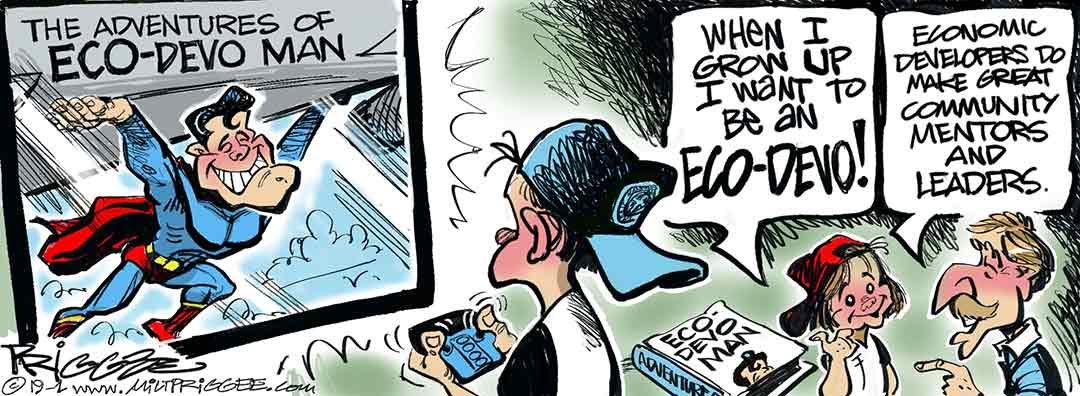It has been over 10 years since the Washington State Department of Commerce and the Association of Washington Cities collaborated to produce the Ten Commandments of Community Leadership. This 32-page booklet, illustrated by Pulitzer Prize winner David Horsey, provided the framework that can create sustainable and vibrant communities for generations to come. More than 15,000 copies were distributed to leaders throughout the state.
As we’ve come to learn, it’s one thing to have a framework for community leadership. But it means nothing without leadership from the top to the bottom.
I bring this up, because the director of the Department of Commerce, Brian Bonlender, has just “retired” after six years and many successes under his leadership. He joins other recent notable retirees like 34 senators and representatives, Elton John and Edgar Martinez’s baseball jersey.
I just recently went to his “retirement” party and listened to many people tout his successes. Under his leadership, he has a lot to be proud of. During his tenure:
- Business recruitments increased by 250%.
- 1,800 small businesses achieved more than $1.09 billion in new international sales.
- The tattered state-local economic development partnership was rebuilt and re-energized.
- The state instituted a new industry sector economic development strategy.
Those are just a few of the accomplishments that were mentioned as people spoke, and I must admit, I took up most of the time with my own roasting of my former boss. (“And what have you done for rural this week, Brian”?)
Now, obviously, Brian didn’t do all of these things himself. He had a team of state and local economic developers that did the heavy lifting.
I have always believed that economic developers have a substantial and substantive role in their community. True, they do not get elected, they don’t seek publicity, they don’t have thousands of Twitter followers (even though I think they should), and they don’t crave for attention or make the headlines. But when it comes to creating healthy communities, they are often the ones who are working hard behind the scenes making the elected officials, the directors and officers look good. In other words, they don’t get noticed very much as community leaders.
There is an old saying in sports, that when the game is on the line, don’t think of the play, think of the players. In other words, put the game in the hands of the people who have the skills, knowledge and experience to make the right plays. The same is true with economic developers. When it comes to recruiting a business, expanding startups, developing entrepreneurs, and funding support resources, let the economic developer implement the appropriate strategy that will win one for the Gipper, um, community.
But just as athletes age and prepare the next generation to carry their team to victory, so to must economic developers prepare people to keep their community revitalized and growing. One of the most important roles that an economic developer can play is the one of mentor. Yet rarely do you see mentoring as part of the job description of economic development practitioners. (As I write this, January is National Mentoring Month, a month that celebrates mentoring relationships. Check out the excellent resources at Mentor Washington. )
In fact, very few traditional schools even offer economic development as a career option much less how to become a mentor in the field. There are great courses and certifications offered by various states and the International Economic Development Council that teach skills. But there aren’t many programs that recognize mentorship as part of an economic development strategy. (I found 5 states that offer mentorship programs, North Carolina, Colorado, Texas, Maryland and Wyoming.)
So how does someone who has not studied to be in this field or learned the practical skills necessary for this profession find a role model or mentor in this profession? Many youths first discover about various professions by watching television, binging on Netflix, or even playing video games.
But there are no shows, movies or video games that feature economic developers as role models or mentors.
Therefore, it is up to the economic developer to provide the “hands on” education for the next generation of practitioners. Just as communities can grow their own entrepreneurs with the right support services, so too can they grow their own economic developers with the right mentoring.
A successful economic developer mentor will ask you to promote your community more than yourself, provide you with a different perspective of the assets, and help break down old negative impressions of where you live that get in the way of success. They will do this by encouraging you to develop new ideas, engage in stimulating conversations, promote strategic thinking, and understand that developing the community’s assets will sustain and stimulate a healthy community.
Brian no doubt will be successful in the next phase of his life because he knows how to surround himself with talented individuals. Soon a new director will take the helm at the Department of Commerce. They will lead a department that will continue to do great work for communities and their economies. But to be successful, their job is to inspire greatness in the economic developer so that they can be a mentor for the next generation.
And no, I didn’t apply for the job. I am already hard at work – at retirement and hopefully mentoring the next generation of practitioners.
- Maury

